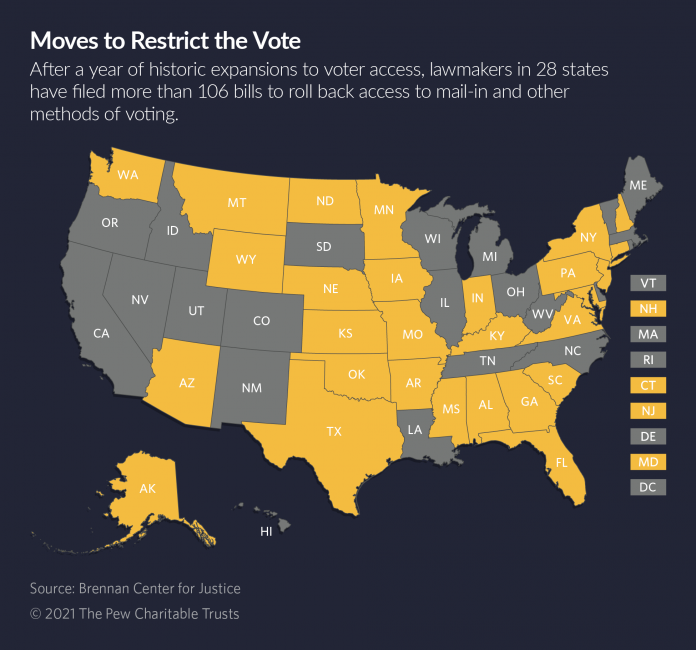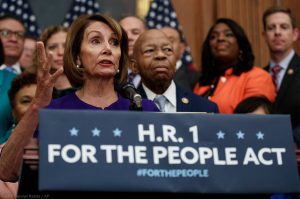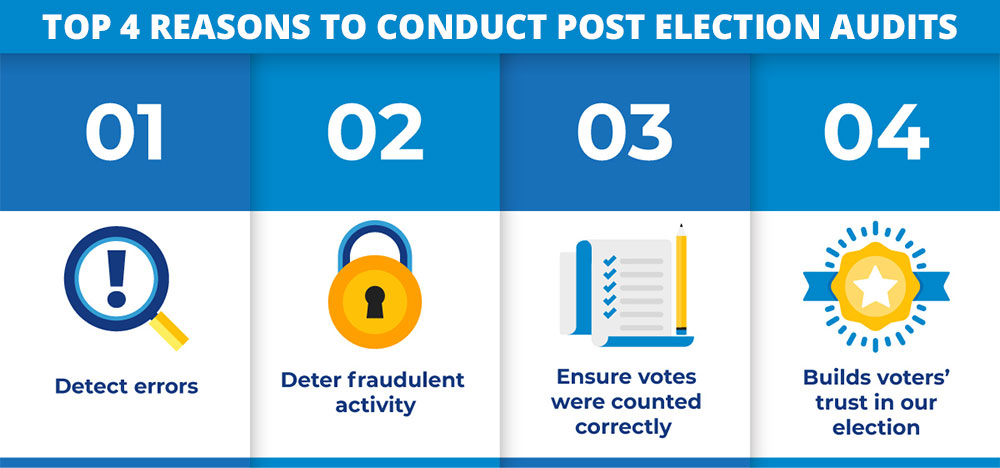Based on a plethora of post-election studies, analyses, and news reports (the latter primarily from independent media), there is an overwhelming presumption among Americans (77% of Republicans and even 20-30% of Democrats) that the 2020 elections were tainted by election fraud. See here, here, here, here, here, here, and here for some of those studies and reports. But what is to be done? At least twenty-eight states are considering changes to election laws, according to CNN. Several states with Republican-dominated legislatures have passed new election laws, including Georgia and Texas. Those measures are not as comprehensive as they should be, having been rushed through largely in response to public pressure. Indeed, Georgia’s new law, in particular, leaves much to be desired despite the Democrat “sound and fury” after it was passed. We can do MUCH better!
 An independent team led by physicist and Mensa John Droz, Jr. has compiled a comprehensive set of recommendations for improving election integrity in all states. The report has just been posted here. The purpose of this article is to briefly summarize the report and its findings. [Note: your correspondent was honored to have been one of the several contributors to the report.]
An independent team led by physicist and Mensa John Droz, Jr. has compiled a comprehensive set of recommendations for improving election integrity in all states. The report has just been posted here. The purpose of this article is to briefly summarize the report and its findings. [Note: your correspondent was honored to have been one of the several contributors to the report.]
This excerpt from the Executive Summary identifies the report’s purpose:
"[Based on continuing news reports about the 2020 elections,] some obvious questions conscientious citizens would have are: 1) what transpired in 2020? 2) how did we allow this situation to get so bad? and 3) what should be done about it now? The answer to question #1 is still unfolding, but we’ll give readers a solid understanding. We will briefly answer question #2. Most of the focus of this Report is about going forward: our recommendations for addressing U.S. election integrity — and we promise a comprehensive answer, with some fresh, new, creative ideas."
Here is why election integrity matters:
"Our perspective is that if American citizens become untethered from their government representatives, then the entire basis of our democratic society (a republic) is undermined. If we allow our foundation to be eroded, there is little else that matters — as we are then relegated to erecting an edifice on a footing of sand. No matter how impressive that structure appears to be, it will not stand the test of time."
 The report was informed by a large number of sources that were linked in the extensive appendices: over thirty pre-2020 election integrity reports (Appendix A), eight previous studies completed by Droz’s team plus fifteen other reports/studies (Appendix B), thirty organizations across the U.S. that are involved in election integrity (Appendix C), and thirteen separate critiques of HR1/SR1 (Appendix E). From these sources, the Droz team constructed the report as follows:
The report was informed by a large number of sources that were linked in the extensive appendices: over thirty pre-2020 election integrity reports (Appendix A), eight previous studies completed by Droz’s team plus fifteen other reports/studies (Appendix B), thirty organizations across the U.S. that are involved in election integrity (Appendix C), and thirteen separate critiques of HR1/SR1 (Appendix E). From these sources, the Droz team constructed the report as follows:
Part 1. What Happened in the 2020 Elections?
Part 2. Why Has Election Integrity Deteriorated This Much?
Part 3. Recommendations — Where the Rubber Meets the Road
Part 4. Post-Election Audits
Part 5. Going Forward — HR-2/S-2, etcetera
Part 6. Conclusions
The key parts are, of course, the recommendations and conclusions. Here is a summary of the report’s recommendations that were extracted and posted separately for ease of understanding:
-
- Election laws and regulations may not be changed within 180 days prior to that election.
- Primary elections must be closed.
- All votes, regardless of voting method, shall be held to equal standards.
- Every state would set up three-week advance voting at convenient locations in every precinct.
- Absentee voting would be allowed only in specialized circumstances.
- Drop Boxes would be prohibited.
- It would be illegal to do ballot harvesting.
- It would be illegal for any state, county, or precinct to accept third-party election-related funds.
- Election Day would be a national holiday.
- All absentee ballots must be received by Election Day.
- Provide voter assistance where needed.
- Some type of legal ID would be required when voting.
- It would be illegal to have any voting machine (or connected server) accessible from the Internet.
- Election day voting would end at 5 PM.
- All absentee and early-voting ballots would be tabulated and reported first.
- Election observers are allowed complete access to the election process.
- Fixing deficient ballots (or mail-in envelopes) is not allowed.
- All Counties would be required to report their election results in a standardized format (e.g., Excel).
- Sample forensic audits should be automatic.
- Chain of custody must be maintained for all ballots for at least 22 months.
- Negative vote tabulations (e.g., Edison) are prohibited without detailed transparent supporting data.
- All eligible U.S. citizens will be automatically registered to vote.
- Every state is required to update its election rolls annually.
- Rules prohibiting non-citizens from voting are tightened.
- A national 800 number and website is set up for citizens to report possible improper election actions.
- Uniform requirements for state vote certification.
- State legislatures have legal standing to file election-related lawsuits.
- Citizens have legal standing to file election-related lawsuits.
- State recall rules must be consistent with state election rules.
- An equally-weighted bi-partisan Federal commission is created in 2021 to research and issue a public report on the voting rules and regulations of European Countries, Canada, Mexico, and Australia.
The report itself provides greater details on each of the above recommendations. The appendices also contain fourteen sample Red state election regulations (Appendix F), eight sample Blue state absentee ballot regulations (Appendix G), fourteen recommended boilerplate election regulations (Appendix H), a miscellaneous collection of twelve post-2020 election integrity ideas going forward (Appendix I), an election ballot flowchart (Appendix J), and a presidential election flowchart (Appendix K).
The report’s conclusion – and indeed the entire report – is a must-read for all Americans concerned about election integrity. This excerpt from Part 6, Conclusions, is particularly poignant:
"From what we know, the Part 3 recommendations are the most comprehensive — yet reasonable — election safeguards proposed anywhere. These measures will assure that future elections reflect the will of the voters.
We expect that those who profit from the current system’s failings will aggressively push back. Since they will not likely acknowledge that their objections are self-serving, they will almost certainly resort to such deceptive standbys as “these regulations will disenfranchise some voters.” The politest answer to that is: hogwash.
Everyone would like to have more… more freedom, more money, more happiness, etc. The good news is that U.S. citizens CAN have more. Essentially there are three avenues to get more: 1) to work for it, 2) to be given it, or 3) to take it.
Being handed more (#2) is the underlying appeal to the concept of entitlements — where these handouts then evolve into becoming Rights. Unscrupulous narcissists promise that they can give us more of these new “Rights” — free college education, a guaranteed job, higher pay, equality with everyone, social justice, etc.
What few are acknowledging or discussing, is that Rights (real or fabricated) are always intrinsically tied to significant responsibilities. Everyone is naturally attracted to the idea of getting more — but it takes the buzz off to reveal that there is no free lunch. The reality is that hard work is required to earn that lunch."
This report – and particularly its recommendations – needs to be given to every elected local, state, and federal official, especially those who are truly concerned about election integrity and who may be (or should be!) working on updating state election laws. Also, U.S. senators in both parties need to be lobbied hard to persuade them not to pass SR1 and replace it with a real election integrity bill based on this report's recommendations. It is a matter of providing equal justice under the law for all Americans in conducting future elections.



